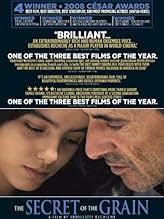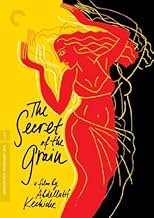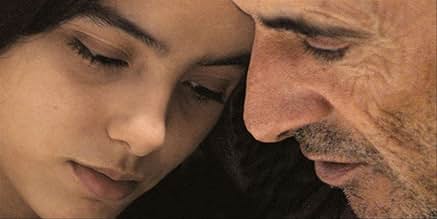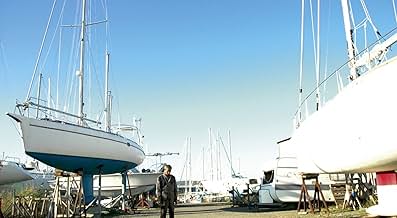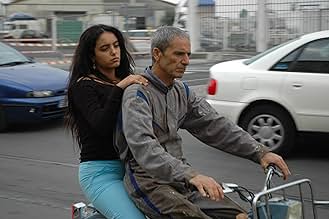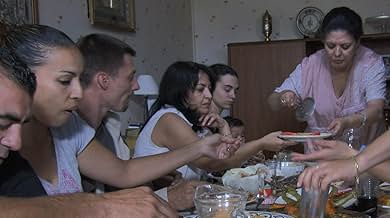AVALIAÇÃO DA IMDb
7,4/10
8,1 mil
SUA AVALIAÇÃO
No sul da França, um trabalhador dos estaleiros navais franco-árabes e a filha de seu parceiro perseguem o sonho de abrir um restaurante.No sul da França, um trabalhador dos estaleiros navais franco-árabes e a filha de seu parceiro perseguem o sonho de abrir um restaurante.No sul da França, um trabalhador dos estaleiros navais franco-árabes e a filha de seu parceiro perseguem o sonho de abrir um restaurante.
- Direção
- Roteiristas
- Artistas
- Prêmios
- 19 vitórias e 9 indicações no total
Nadia Taoul
- Sarah
- (as Nadia Taouil)
- Direção
- Roteiristas
- Elenco e equipe completos
- Produção, bilheteria e muito mais no IMDbPro
Avaliações em destaque
It's the third movie of Abdellatif Kechiche (coming after "La Faute à Voltaire", and "L'Esquive"). All these movies deal in a way or another with the life of Tunisian immigrants in France.
This time in "Couscous" the director wanted to show his own background, the universe of his own family, Tunisian immigrants living in Nice, and especially he wanted to bring a tribute to his father, the man who had struggled for all his life to transmit a sense to all of them. It was not to be a biographical film, what Mr. Kechiche was looking for was to catch an atmosphere, and I would say, to catch the ethos.
The shootings have not been done in Nice, as the director feared to become much too sentimental. The chosen location was Sète instead, a small Mediterranean town, where the fishermen leave on their boats each morning and sometimes reach North Africa or the Asian borders, a town struggling with the same issues as everywhere in Europe nowadays: decline of production and unemployment, with the small shipyard challenged by concurrence, the fishing industry challenged the same.
The director had intended to ask his father to play in the movie and started to look for funding and to organize the team. Meanwhile the father passed away. Mr. Kechiche decided then to put a Tunisian actor in the role of the father. It was Mustapha Adouani, whom the director knew very well. Exactly when shootings were to start, Mr. Adouani fell gravely ill (he died after a few months), so they had to find on the spot another solution.
And the solution they found proved brilliant: they hired a non-actor, Habib Boufares, a worker from Nice, a lifelong friend of the father. The role fitted to him as a glove! Actually almost the whole team is of non-actors. The screenplay details were very loosely followed, the director left to the cast the full liberty to improvise. They were playing their own kind of life after all! And they lived their life there, in front of the camera (it was a hand-held camera , to not impede the non-actors in any way). This movie breathes trough all its pores of life, of authenticity, of immediacy! There are only a few professional actors in the cast. Hafsia Herzi (a young actress showing stamina and commitment) plays the step-daughter of the father, a very determined girl, sincerely attached to him and giving full support in difficult moments. There is also Alice Houri, bringing in a secondary role force and sincerity.
I have read the reviews to this movie. Many of them are very critical. The movie is excessively long, they say, and there are a lot of scenes that could have been much shorter without loosing anything. It is a 150 minutes film: one third is devoted to a dinner in family; the mother has prepared fish couscous (you could guess), an endless chat is about anything and nothing; a second third is devoted to a dinner on a boat-restaurant, where everybody is waiting for the main course (fish couscous, you betcha).
Well, it depends on your taste to like this movie or not (it goes the same with the couscous as a dish). I think the director took this risk, to let each scene to unfold on its own, regardless how long it was taking, for the sake of authenticity. He was interested in catching the universe of that community of Tunisian immigrants, in rendering it as natural as it really is; to get this way the ethos of that world. And he needed for this to not interfere in any way: neither by screenplay, nor by camera, nor by editing.
It is a family risking to disintegrate: the parents are separated, one of the sons is cheating his wife, there are tensions with the step-daughter. What keep them strong is the recourse to their specificity when need is: their cuisine, the wonderful plates with fish couscous. And their music and dance, in the most dramatic moments. There is a long scene of belly dance at the end of the movie: I don't want to say more, to not spoil the story. These guys speak only French and follow the French system of values. They keep however their cultural origins as assets.
Some reviewers mentioned "Eat Drink Man Woman" of Ang Lee: there also it is cuisine that keeps family against disintegration. I would mention also in this context "A Touch of Spice": a Greek family forced to leave Istanbul will keep their specific identity by keeping to "Politiky Kouzina", the way Greeks from Istanbul use spices in their dishes.
For me "Couscous" called in mind also "35 Rhums", another French movie whose heroes also belong to an ethnic minority in France.
I think somehow the family in "Couscous" and the movie itself resemble: both could disintegrate, both keep ultimately strong, the family keeping to their cuisine, the movie by keeping to the authenticity of this universe and by getting their ethos.
This time in "Couscous" the director wanted to show his own background, the universe of his own family, Tunisian immigrants living in Nice, and especially he wanted to bring a tribute to his father, the man who had struggled for all his life to transmit a sense to all of them. It was not to be a biographical film, what Mr. Kechiche was looking for was to catch an atmosphere, and I would say, to catch the ethos.
The shootings have not been done in Nice, as the director feared to become much too sentimental. The chosen location was Sète instead, a small Mediterranean town, where the fishermen leave on their boats each morning and sometimes reach North Africa or the Asian borders, a town struggling with the same issues as everywhere in Europe nowadays: decline of production and unemployment, with the small shipyard challenged by concurrence, the fishing industry challenged the same.
The director had intended to ask his father to play in the movie and started to look for funding and to organize the team. Meanwhile the father passed away. Mr. Kechiche decided then to put a Tunisian actor in the role of the father. It was Mustapha Adouani, whom the director knew very well. Exactly when shootings were to start, Mr. Adouani fell gravely ill (he died after a few months), so they had to find on the spot another solution.
And the solution they found proved brilliant: they hired a non-actor, Habib Boufares, a worker from Nice, a lifelong friend of the father. The role fitted to him as a glove! Actually almost the whole team is of non-actors. The screenplay details were very loosely followed, the director left to the cast the full liberty to improvise. They were playing their own kind of life after all! And they lived their life there, in front of the camera (it was a hand-held camera , to not impede the non-actors in any way). This movie breathes trough all its pores of life, of authenticity, of immediacy! There are only a few professional actors in the cast. Hafsia Herzi (a young actress showing stamina and commitment) plays the step-daughter of the father, a very determined girl, sincerely attached to him and giving full support in difficult moments. There is also Alice Houri, bringing in a secondary role force and sincerity.
I have read the reviews to this movie. Many of them are very critical. The movie is excessively long, they say, and there are a lot of scenes that could have been much shorter without loosing anything. It is a 150 minutes film: one third is devoted to a dinner in family; the mother has prepared fish couscous (you could guess), an endless chat is about anything and nothing; a second third is devoted to a dinner on a boat-restaurant, where everybody is waiting for the main course (fish couscous, you betcha).
Well, it depends on your taste to like this movie or not (it goes the same with the couscous as a dish). I think the director took this risk, to let each scene to unfold on its own, regardless how long it was taking, for the sake of authenticity. He was interested in catching the universe of that community of Tunisian immigrants, in rendering it as natural as it really is; to get this way the ethos of that world. And he needed for this to not interfere in any way: neither by screenplay, nor by camera, nor by editing.
It is a family risking to disintegrate: the parents are separated, one of the sons is cheating his wife, there are tensions with the step-daughter. What keep them strong is the recourse to their specificity when need is: their cuisine, the wonderful plates with fish couscous. And their music and dance, in the most dramatic moments. There is a long scene of belly dance at the end of the movie: I don't want to say more, to not spoil the story. These guys speak only French and follow the French system of values. They keep however their cultural origins as assets.
Some reviewers mentioned "Eat Drink Man Woman" of Ang Lee: there also it is cuisine that keeps family against disintegration. I would mention also in this context "A Touch of Spice": a Greek family forced to leave Istanbul will keep their specific identity by keeping to "Politiky Kouzina", the way Greeks from Istanbul use spices in their dishes.
For me "Couscous" called in mind also "35 Rhums", another French movie whose heroes also belong to an ethnic minority in France.
I think somehow the family in "Couscous" and the movie itself resemble: both could disintegrate, both keep ultimately strong, the family keeping to their cuisine, the movie by keeping to the authenticity of this universe and by getting their ethos.
I have heard this film being compared to Eat Drink Man Woman, which is fair enough, if not slightly deceptive. Sure, there's a similar veneration for the art of cooking and how this draws and binds families. But the film casts a wider net than this may suggest. For me, it strongly resembles the humanistic and naturalistic stories of Robert Guédiguian, particularly La ville est tranquille (The Town is Quiet).
The actors are largely non-professionals. The use of long takes, including long stretches of dialogue, is very impressive and suggests that some of the script may be improvisational. I liked the chit-chat, the small details of daily life (like toilet-training a child), that films normally gloss over.
The film has a documentary look and feel and parts are like a fly-on-the-wall at a family gathering. For me, the importance of this is to convey how human this family is, with a rich and warm cultural heritage. In particular, it renders as impotent, irrational fears of Muslim culture.
The film works on multiple levels because it taps into the universal everyday concerns that potentially touch us all in one form or another: prejudice against immigrants, attitudes towards Islam post 9-11, globalisation, ageism in the workforce, the effects of poverty, family breakdown and more. Yet, importantly, the film is not preachy but merely presents life in a matter-of-fact way.
The female performances in the film are particularly affecting, especially the young Hafsia Herzi playing Rym, the daughter of Slimane's lover, and Leila D'Issernio who plays his Russian daughter-in-law.
At 148 minutes, the film is quite long, though this is not apparent until the final scene, which seems to be prolonged in real-time for a particular effect. On paper, the story looks like something we've seen before, but avoids all the clichés we might expect. I loved it.
The actors are largely non-professionals. The use of long takes, including long stretches of dialogue, is very impressive and suggests that some of the script may be improvisational. I liked the chit-chat, the small details of daily life (like toilet-training a child), that films normally gloss over.
The film has a documentary look and feel and parts are like a fly-on-the-wall at a family gathering. For me, the importance of this is to convey how human this family is, with a rich and warm cultural heritage. In particular, it renders as impotent, irrational fears of Muslim culture.
The film works on multiple levels because it taps into the universal everyday concerns that potentially touch us all in one form or another: prejudice against immigrants, attitudes towards Islam post 9-11, globalisation, ageism in the workforce, the effects of poverty, family breakdown and more. Yet, importantly, the film is not preachy but merely presents life in a matter-of-fact way.
The female performances in the film are particularly affecting, especially the young Hafsia Herzi playing Rym, the daughter of Slimane's lover, and Leila D'Issernio who plays his Russian daughter-in-law.
At 148 minutes, the film is quite long, though this is not apparent until the final scene, which seems to be prolonged in real-time for a particular effect. On paper, the story looks like something we've seen before, but avoids all the clichés we might expect. I loved it.
Something unusual happened at the end of this movie projection. Several people not knowing each other gathered at the cinema exit and discussed the movie. It appeared that the movie was spoiled by several cinematographic tics which the director promoted to the status of the style and used all over the movie "ad nausea". He extends the lengthy sequences probably to make us share the uneasiness of the characters in the given situation (the mother scolding the child for weeing in her panties, the guests waiting for the cous-cous, the final run of Slimane and the belly dance). But this is a 0-level translation of the reality into the cinematographic language. The profusion of the very close-ups and the clip-like filming with very short shots is a minor default. It is probably one of the points which makes some people like the movie as "modern". The movie is almost twice as long as usual and I can not find any cinematographic reason to make it this long, if not just the desire to convince the spectator (and jury) that this movie has something exceptional. We spent some good moments but we hope that this gifted director will not be encouraged to belaborates more in his future creations.
Tunisian born French director Abdellatif Kechiche's third feature Secret of the Grain is dedicated to his father whose silence after a long day of hard work reflects the demeanor of the film's lead protagonist, Slimane Beiji (Habib Boufares), a Tunisian immigrant who has been laid off from his job in the shipyards after thirty five years. Winner of best picture, director, screen play and actress awards at the 2008 Cesar Awards, the film is not a Loach-type work of social consciousness but a rich, varied, multi-layered family drama that is universal in its appeal. Although the English title of the film suggests there is some secret held by the grain, the only secret in Secret of the Grain is how Kechiche manages to seamlessly weld together into a cohesive whole such disparate elements as the traditions of great cooking, the problems immigrants confront when dealing with white authority, and the desire to leave a legacy to your children.
Set in the French coastal village of Séte on the Mediterranean, the grain in the title refers to couscous, a diet staple of Tunisian immigrants and a dish that Slimane hopes to use to turn a dilapidated old boat into a profitable restaurant with his ex-wife Souad (Bouraouia Marzouk) doing the cooking. Shot with a hand-held camera that bobs and weaves through long takes of eating, animated dinner conversations, and emotional family disputes, the 151-minute Secret of the Grain has the authenticity you would expect if you accidentally stumbled into a Greek restaurant where an animated family dinner was taking place. In a scene at one of the two family dinners that take up half of the film, the length and variety of facial close-ups of people chewing, laughing, and talking in multi-cultural accents is staggering.
The centerpiece of the film is Slimane and his clan consisting of his two sons, five daughters, grandchildren, his ex-wife Souad, his lover Latifa (Hatika Karaoui), and her fiery twenty-year-old daughter Rym (Hafsia Herzi) who adores Slimane and whose energy and business acumen is the catalyst for his risky venture. Slimane, a man of sixty-one whose periods of silence stand in sharp contrast to the loquaciousness of his family, lives in a modest room in a weather-beaten hotel run by Latifa. A generous man, Slimane collects fish from his fisherman friends and delivers them each week to Souad, his older daughter Karima (Faridah Benkhetache); and Latifa.
The first hour delves into mundane family matters. When Slimane visits his eldest daughter Karima (Farida Benkhetache) to deliver some fish, Karima's anger at her three year-old daughter who refuses the potty dominates the conversation which continues for almost ten minutes interspersed with comments about the decline of the shipping industry. Other extended domestic scenes revolve around the escapades of Slimane's irresponsible son Majid (Sami Zitouni) whose extra-marital affairs threaten to drive his Russian wife Julia (Alice Houri) out of the family. The idea of starting a restaurant at age sixty-one raises much skepticism in the community and Slimane's plans are considered too thin and too unsupported by economic reality by the bank he asks for a loan.
To prove the worth of his idea, however, Slimane invites one hundred city officials, potential investors, friends and family to the boat that he, Rym, and his son Riadh (Mohamed Benabdeslem) painstakingly renovated. The opening night turns out to be an astonishing tour de force that combines life-affirming exuberance, sensual music and belly dancing, and an avoidable crisis that leads to heightened family tension and a suspenseful final half hour. Kechiche, a former movie and TV actor, has assembled an outstanding ensemble cast with first rate performances, especially from Boufares and Herzi. Though the film has many discussions about food, it is not a feel-good "food movie" but a complex, deeply intense narrative that elevates one family's personal struggles into a drama of epic scope.
Set in the French coastal village of Séte on the Mediterranean, the grain in the title refers to couscous, a diet staple of Tunisian immigrants and a dish that Slimane hopes to use to turn a dilapidated old boat into a profitable restaurant with his ex-wife Souad (Bouraouia Marzouk) doing the cooking. Shot with a hand-held camera that bobs and weaves through long takes of eating, animated dinner conversations, and emotional family disputes, the 151-minute Secret of the Grain has the authenticity you would expect if you accidentally stumbled into a Greek restaurant where an animated family dinner was taking place. In a scene at one of the two family dinners that take up half of the film, the length and variety of facial close-ups of people chewing, laughing, and talking in multi-cultural accents is staggering.
The centerpiece of the film is Slimane and his clan consisting of his two sons, five daughters, grandchildren, his ex-wife Souad, his lover Latifa (Hatika Karaoui), and her fiery twenty-year-old daughter Rym (Hafsia Herzi) who adores Slimane and whose energy and business acumen is the catalyst for his risky venture. Slimane, a man of sixty-one whose periods of silence stand in sharp contrast to the loquaciousness of his family, lives in a modest room in a weather-beaten hotel run by Latifa. A generous man, Slimane collects fish from his fisherman friends and delivers them each week to Souad, his older daughter Karima (Faridah Benkhetache); and Latifa.
The first hour delves into mundane family matters. When Slimane visits his eldest daughter Karima (Farida Benkhetache) to deliver some fish, Karima's anger at her three year-old daughter who refuses the potty dominates the conversation which continues for almost ten minutes interspersed with comments about the decline of the shipping industry. Other extended domestic scenes revolve around the escapades of Slimane's irresponsible son Majid (Sami Zitouni) whose extra-marital affairs threaten to drive his Russian wife Julia (Alice Houri) out of the family. The idea of starting a restaurant at age sixty-one raises much skepticism in the community and Slimane's plans are considered too thin and too unsupported by economic reality by the bank he asks for a loan.
To prove the worth of his idea, however, Slimane invites one hundred city officials, potential investors, friends and family to the boat that he, Rym, and his son Riadh (Mohamed Benabdeslem) painstakingly renovated. The opening night turns out to be an astonishing tour de force that combines life-affirming exuberance, sensual music and belly dancing, and an avoidable crisis that leads to heightened family tension and a suspenseful final half hour. Kechiche, a former movie and TV actor, has assembled an outstanding ensemble cast with first rate performances, especially from Boufares and Herzi. Though the film has many discussions about food, it is not a feel-good "food movie" but a complex, deeply intense narrative that elevates one family's personal struggles into a drama of epic scope.
Abdellatif Kechiche, who is also an actor, stands with Turkish-German director Faith Akim as the preeminent director dealing with diaspora experience in western Europe. He was born in Tunisia but was brought to France at the age of six and grew up in Nice. 'La graine et le mulet,' the title, refers to (mullet) fish couscous (grain) and Kechiche has said he's as stubborn as the mullet. The action is in the southern French port town of Sète. Most of the cast are non-actors.
Though marred by a jittery camera in intimate scenes, over-close closeups, and some sequences that are allowed to run too long, 'The Secret of the Grain' is nonetheless a triumph, an emotionally powerful, overwhelmingly rich, epic-feeling tragi-comedy that overflows with wonderful performances, evokes a host of masters including Jean Renoir and the Italian neorealists, and fairly bursts off the screen with its loving and complex portraits of Magreban society in France and the harsh world in which it struggles and survives. The main focus for all this is food: two grand meals, one intimate and familial, the other in a projected couscous restaurant on an old boat where friends and family and local officials are all invited to show off cuisine and entertainment in an effort to prove that an old man at the end of his tether can, with the help of his family and friends, make a go of it in a new business, against all odds. Kechiche and his cast focus not so much on any plot-line arc, though there are dramatic turns of events right up to the end, but on the way they work as an ensemble to make each moment come alive. In the somewhat stilted, over-polished and over-sophisticated and often dry world of French cinema, it's not hard to see how the rough, irresistible energy of the world Kechiche brings to the screen here would seem a welcome tonic. And, it has to be admitted, giving the same very gifted Arab director the run of the Césars twice can't help but be soothing to the consciences of the left-liberal intellectuals who tend to dominate the world of French film criticism. It doesn't hurt that 'Secret' is offered by Pathé and has the imprimatur of the prestigious producer Claude Berri.
Kechiche's previous (and second) film 'L'Esquive' ("The Avoidance"), retitled in English 'Games of Love and Chance' (after the 18th-century playwright Marivaux's work which is central to the plot) which won four Césars, including Best Director and Best Film, was about the young mixed population of children of immigrants who live in the ghetto-like suburban Paris 'banlieue.' This new story is a homage to the "fathers," the generation of Kechicne's parents, who immigrated to France forty or fifty years ago.
Hence the protagonist is the sad but determined Slimane Beiji (Habib Boufares), who as the movie begins is told by his boss at the port shipyard workshop that, now sixty-one, he is no longer "rentable" (profitable), his work is too slow, he doesn't keep up with the schedule on projects. Threatened with no benefits because earlier in his 35 years at the site he was off the books and now offered only half-time status, he quits. He lives in a room in a little hotel run by his lover, Latifa (Hatika Karaoui), whose daughter Rhn (Hafsia Herzi) considers Slimane her own dad and defends him against his mean sons by his ex-wife Souad (Bouraouia Marzouk). He owes her alimony, but brings fish instead. The sons say he ought to go back to the 'bled,' the old country; they want to be rid of him.
Slimane's eldest son Hamid (Abdelhamid Aktouche) is married to a Russian woman. His family evidently know about his philandering and especially his affair with the deputy mayor's wife--the need to conceal which becomes a plot pivot-point.
While Slimane is alone in his little hotel room Souad has a big fish couscous dinner with their offspring and their French husbands and children. This sequence is irritating at times for its clamorous, shifting closeups and its cacophonous talk, but at the same time the way this lively, tumultuous gathering in close quarters has been shot is a tour-de-force of complex naturalism. When the sons bring Slimane a dish of the fish couscous, he gets the idea of enlisting his ex-wife to be the cook in a restaurant he might establish in an abandoned ship. Rhm goes with him to the bank and city offices to present the project where they're politely received, but not given the green light. This is where the idea comes to give a grand dinner on the ship to convince everyone Slimane and company can make a go of it. A lot of the second half of the movie consists of this dinner.
The naturalism of the sequence may be suggested by the fact that Bouraouia Marzouk actually did a lot of the cooking for 100 people for the dinner. The theft of Slimane's Moubylette is a conscious homage to De Sica's 'Bicycle Thief' ('Ladri di biciclette'). 'La graine et le mulet' is a thrilling, amusing, moving, excruciating screen experience that takes Abdellatif Kechiche to a new level of accomplishment, but the vagaries of his methods will continue to create enemies as well as admirers as he goes along. As Jacques Mandelbaum wrote in 'Le Monde,' 'The Secret of the Grain' "mixes romance and social chronicle, melodrama and comedy, the triviality of the everyday and the grandeur of tragedy. A simple family meal becomes a classic sequence, a table of old immigrants becomes a Greek chorus, a belly dance a high point of erotic vibration and dramatic tension." For all its flaws, this movie packs a huge wallop and brings Adbellatif Kechiche to the brink of greatness.
Though marred by a jittery camera in intimate scenes, over-close closeups, and some sequences that are allowed to run too long, 'The Secret of the Grain' is nonetheless a triumph, an emotionally powerful, overwhelmingly rich, epic-feeling tragi-comedy that overflows with wonderful performances, evokes a host of masters including Jean Renoir and the Italian neorealists, and fairly bursts off the screen with its loving and complex portraits of Magreban society in France and the harsh world in which it struggles and survives. The main focus for all this is food: two grand meals, one intimate and familial, the other in a projected couscous restaurant on an old boat where friends and family and local officials are all invited to show off cuisine and entertainment in an effort to prove that an old man at the end of his tether can, with the help of his family and friends, make a go of it in a new business, against all odds. Kechiche and his cast focus not so much on any plot-line arc, though there are dramatic turns of events right up to the end, but on the way they work as an ensemble to make each moment come alive. In the somewhat stilted, over-polished and over-sophisticated and often dry world of French cinema, it's not hard to see how the rough, irresistible energy of the world Kechiche brings to the screen here would seem a welcome tonic. And, it has to be admitted, giving the same very gifted Arab director the run of the Césars twice can't help but be soothing to the consciences of the left-liberal intellectuals who tend to dominate the world of French film criticism. It doesn't hurt that 'Secret' is offered by Pathé and has the imprimatur of the prestigious producer Claude Berri.
Kechiche's previous (and second) film 'L'Esquive' ("The Avoidance"), retitled in English 'Games of Love and Chance' (after the 18th-century playwright Marivaux's work which is central to the plot) which won four Césars, including Best Director and Best Film, was about the young mixed population of children of immigrants who live in the ghetto-like suburban Paris 'banlieue.' This new story is a homage to the "fathers," the generation of Kechicne's parents, who immigrated to France forty or fifty years ago.
Hence the protagonist is the sad but determined Slimane Beiji (Habib Boufares), who as the movie begins is told by his boss at the port shipyard workshop that, now sixty-one, he is no longer "rentable" (profitable), his work is too slow, he doesn't keep up with the schedule on projects. Threatened with no benefits because earlier in his 35 years at the site he was off the books and now offered only half-time status, he quits. He lives in a room in a little hotel run by his lover, Latifa (Hatika Karaoui), whose daughter Rhn (Hafsia Herzi) considers Slimane her own dad and defends him against his mean sons by his ex-wife Souad (Bouraouia Marzouk). He owes her alimony, but brings fish instead. The sons say he ought to go back to the 'bled,' the old country; they want to be rid of him.
Slimane's eldest son Hamid (Abdelhamid Aktouche) is married to a Russian woman. His family evidently know about his philandering and especially his affair with the deputy mayor's wife--the need to conceal which becomes a plot pivot-point.
While Slimane is alone in his little hotel room Souad has a big fish couscous dinner with their offspring and their French husbands and children. This sequence is irritating at times for its clamorous, shifting closeups and its cacophonous talk, but at the same time the way this lively, tumultuous gathering in close quarters has been shot is a tour-de-force of complex naturalism. When the sons bring Slimane a dish of the fish couscous, he gets the idea of enlisting his ex-wife to be the cook in a restaurant he might establish in an abandoned ship. Rhm goes with him to the bank and city offices to present the project where they're politely received, but not given the green light. This is where the idea comes to give a grand dinner on the ship to convince everyone Slimane and company can make a go of it. A lot of the second half of the movie consists of this dinner.
The naturalism of the sequence may be suggested by the fact that Bouraouia Marzouk actually did a lot of the cooking for 100 people for the dinner. The theft of Slimane's Moubylette is a conscious homage to De Sica's 'Bicycle Thief' ('Ladri di biciclette'). 'La graine et le mulet' is a thrilling, amusing, moving, excruciating screen experience that takes Abdellatif Kechiche to a new level of accomplishment, but the vagaries of his methods will continue to create enemies as well as admirers as he goes along. As Jacques Mandelbaum wrote in 'Le Monde,' 'The Secret of the Grain' "mixes romance and social chronicle, melodrama and comedy, the triviality of the everyday and the grandeur of tragedy. A simple family meal becomes a classic sequence, a table of old immigrants becomes a Greek chorus, a belly dance a high point of erotic vibration and dramatic tension." For all its flaws, this movie packs a huge wallop and brings Adbellatif Kechiche to the brink of greatness.
Você sabia?
- CuriosidadesShooting was supposed to start in the summer of 2005 but one of the leading actors was sick, which resulted in a major delay. Thus, filming actually started on 5 September 2005 and was still running by 16 January 2006. The set was on a boat in the port of Sète for at least six weeks from October to December 2006. Outside temperatures were very low, as opposed to what they should have been if schedule could have been held. This led the production to set up large tents near the boat with heating systems for the actors and extras to remain comfortable between takes.
- ConexõesFeatured in Maltin on Movies: Flipped (2010)
- Trilhas sonorasEl fan hob wa imane
Written by Mohamed Abdel Wahab and Hussein El Sayed
Principais escolhas
Faça login para avaliar e ver a lista de recomendações personalizadas
- How long is The Secret of the Grain?Fornecido pela Alexa
Detalhes
Bilheteria
- Faturamento bruto nos EUA e Canadá
- US$ 86.356
- Fim de semana de estreia nos EUA e Canadá
- US$ 9.850
- 28 de dez. de 2008
- Faturamento bruto mundial
- US$ 14.776.783
- Tempo de duração2 horas 31 minutos
- Cor
- Mixagem de som
- Proporção
- 1.85 : 1
Contribua para esta página
Sugerir uma alteração ou adicionar conteúdo ausente

Principal brecha
By what name was O Segredo do Grão (2007) officially released in India in English?
Responda
